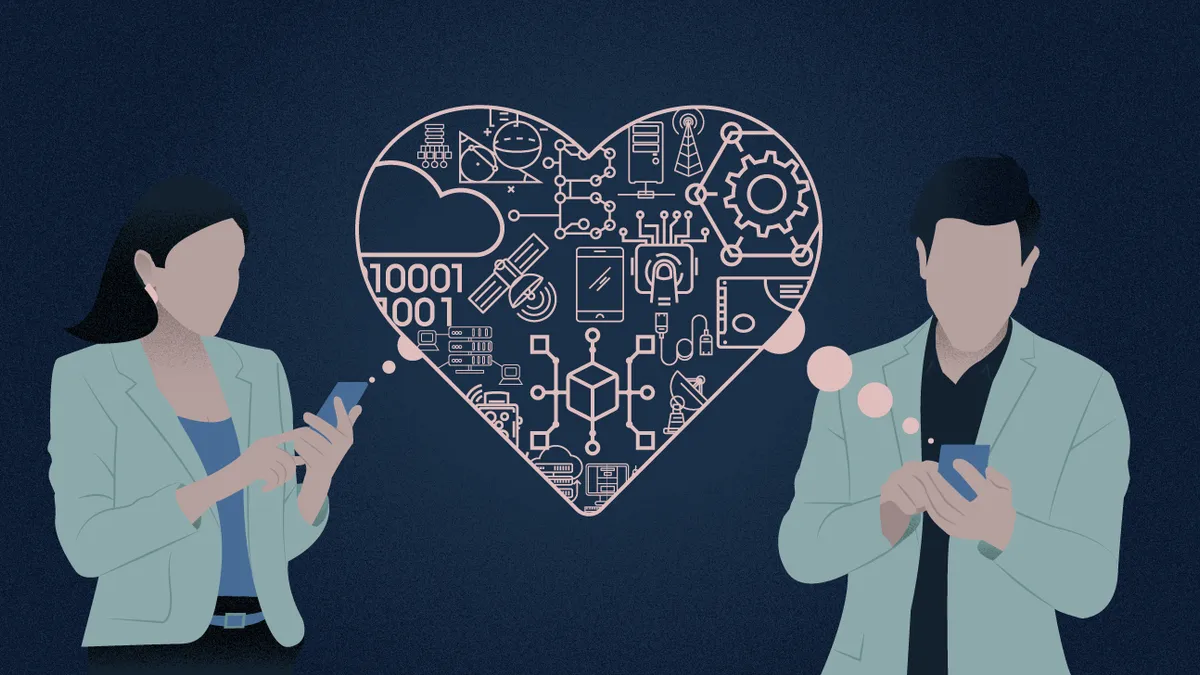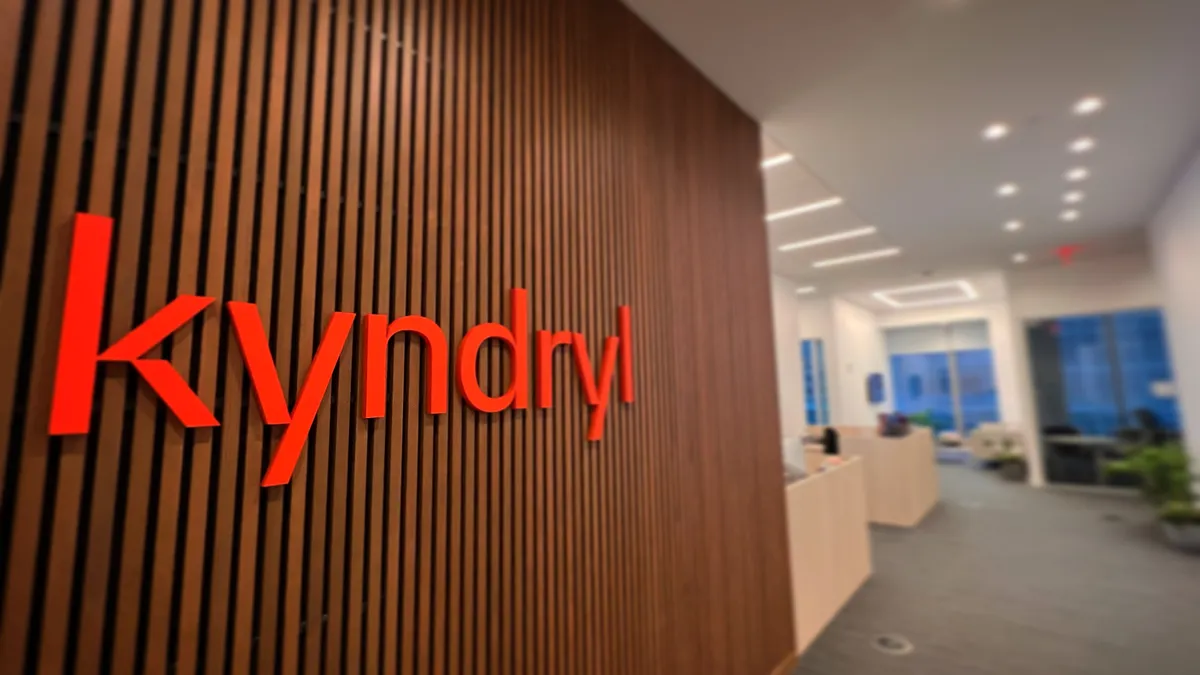Editor's note: With Valentine's Day around the corner, CIO Dive is resurfacing our conversation with OkCupid's head of technology. As a note, this piece ran last year prior to GDPR's implementation, and some of the conversation reflects that the regulation was not in effect at the time.
As the world gears up for its annual celebration — or lamentation — of love, there are many heroes to thank: the local baker up all night making red velvet cupcakes, the florist with two dozen cuts from rose thorns, the late night fast food worker servicing nonconformist couples and grieving singles.
But, perhaps most importantly, society must thank the internet. The role of technology in love today is irrefutable.
Through a variety of apps and websites, the internet brings together an immeasurable number of couples every day, from run-of-the-mill Joes and Janes to farmers, clowns, vegans and "those with beards [and] those who want to stroke beards." Just look at the numbers:
-
40%: The proportion of Americans using online dating websites and apps
-
$3,000,000,000: The annual revenue of the dating services industry
-
1 in 5: The number of committed relationships that began online
-
70%: The percentage of singles using dating apps at work
For every online blogger lamenting the role of technology in modern love is a team of data scientists, developers and engineers tinkering away behind the scenes to help millions of people find true love, whether for a night or a lifetime.
OkCupid has had its skin in the game longer than most dating sites. The company was founded in 2004 and acquired by Match Group in 2011. Today it handles millions of users, supporting 7.3 million messages a day and one million app installations a week.
CIO Dive spoke with OkCupid's CIO Alex Dumitriu about what it takes from a digital perspective to make love happen and how evolving business technologies have changed the business's model. The technology of love is no different than the technology that powers a less amorous business, running the gamut of cloud, Big Data, artificial intelligence, software and even cybersecurity.
But the stakes of dating technology and how it intersects with the consumer are often higher.
After all, not liking a sweater Amazon recommended and going on a terrible date are very different scenarios, and one has the potential to impact a customer far beyond the lifetime of a cheap and vaguely inappropriate holiday sweater bought on a whim.
Staying in-house while getting you out of your's
The bread and butter of a dating site like OkCupid is the cache of personal information collected through the platform.
"Our data has been big since before Big Data was a thing that people were talking about," said Dumitriu. "The actual footprint of what we collect hasn't changed that much on a per capita basis, but our ability to do fast, ad hoc analysis on that data has improved tremendously."
When he joined the company in 2011, OkCupid had a completely bespoke analytics stack. But the tools for processing Big Data have changed and so have the company's systems.
"In the last 18 months, we've spun up an analytics suite that's mostly cloud based, that's backed by Redshift on AWS," said Dumitriu. "That's probably our largest footprint in terms of these sort of proprietary, black box systems."
"We're trying to develop a security-first culture where it's based into the software development life cycle so that it's not just our people that have security in their title that are thinking about those things."

Alex Dumitriu
CIO of OkCupid
The move to AWS is a departure for OkCupid, which has a history of keeping technology in-house, aided by a staff that is comprised two-thirds of backend, frontend and application developers.
"Our general philosophy has been we prefer to either use open source projects off the shelf or build something ourselves," said Dumitriu. "We're very reticent to go to closed-source commercial systems."
The desire to move away from the current proprietary system is not necessarily based on the idea that public cloud is less secure or reliable than a private one. It's just that for a tech team used to developing in-house, they understand something built in-house a lot better. Dumitriu is also wary of tying the company to proprietary systems that might limit future flexibility.
"It's one thing if you stand up a MySQL server on a virtual machine in the cloud. It's an entirely different thing if you tie yourself entirely to something like Dynamo in terms of your ability to move later to a different cloud or to a hybrid cloud," said Dumitriu.
In the long-term, OkCupid has its eye on moving to a private cloud model with Kubernetes-orchestrated containers, according to Dumitriu.
"The idea there is once we have a private cloud running on our own premises, that gives us a lot more flexibility in terms of having first capacity in the public cloud or even a more large-scale migration, should that ever be something we want to undertake.
Protecting your deepest, darkest secrets
In his two years as CIO, Dumitriu's role has evolved to focus more on security and compliance as both OkCupid and Match Group navigate the threat landscape. After all, a platform collecting intimate details of users' lives is an enticing target for malicious actors.
"We're trying to develop a security-first culture where it's based into the software development lifecycle so that it's not just our people that have security in their title that are thinking about those things," said Dumitriu.
This is not to say the company did not focus on security before, but during Dumitriu's time as CIO, OkCupid has tried to instill it from the ground up with every new tool and service developed.
But no business is foolproof, and preparing for the worst case is important — especially when GDPR is set to take effect in a few months and significantly increase fines for insufficient data management.
"Our data has been big since before Big Data was a thing that people were talking about."

Alex Dumitriu
CIO of OkCupid
While OkCupid does not market overseas, it does have a significant international base and contact with the PII of EU citizens. When the company sat down and assessed the effects of the regulation, it realized it had no choice but to comply. The path to compliance is a huge focus for the company in 2018 as the deadline looms.
"I wouldn't say that it changes a ton about how we collect data and what data we collect," said Dumitriu. "What it does change significantly is the lifecycle of that data. So retention policies and all of the right to export, right to delete stuff, there's a fair amount of policy end-tooling that we're needing to build up."
Dumitriu and his team believe OkCupid will be fully compliant come May 25. But the vagueness of GDPR and a lack of case precedent means uncertainty in specific requirements for most businesses.
In the meantime, OkCupid and other dating sites will continue improving upon existing systems and harnessing new technologies to make the dating world a little simpler, one couple at a time. Just look what dating services did for man's best friend:





















